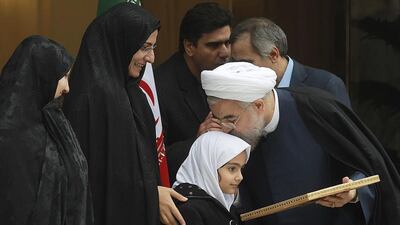NEW YORK // After the euphoria that greeted the deal over Iran’s nuclear programme, the difficult work begins with coordinating the potentially treacherous phase of implementing the agreement and negotiating a long-term accord.
Washington’s closest allies in the region remain unconvinced of Tehran’s intentions and threatened by its regional policies, a sceptical US Congress is itching to apply new sanctions, and a stark lack of clarity remains about what a long-term agreement would entail, if one is ever reached at all.
"Now the really hard part begins, and that is the effort to get the comprehensive agreement, which will require enormous steps in terms of verification, transparency, and accountability," the US secretary of state, John Kerry, said after Sunday's deal.
“We’ll start today, literally, to continue the efforts out of Geneva and to press forward.”
The efforts to move the pact forward were buoyed yesterday as Saudi Arabia and Qatar joined the UAE and Bahrain in welcoming – albeit cautiously – the deal, with the Saudi cabinet saying it could be "a step towards a comprehensive solution if there is goodwill".
The US president, Barack Obama, had moved quickly to try to placate regional allies, and called the Israeli prime minister, Benjamin Netahyahu, to reassure the leader, who has vehemently opposed the US-led diplomacy while administration officials called members of Congress to defend the accord.
Mr Netanyahu said yesterday he would dispatch a top envoy to the US this week to discuss a final nuclear deal with Iran.
“The concessions that both sides will be required to make will be far more painful. In particular, it remains to be seen whether Iran is prepared to accept a final deal that would give them what they want in practice, but not in theory,” Kenneth Pollack, an expert on US-Iran policy at the Brookings Institution said. “If Tehran insists on standing on principle, especially on its ‘right’ to enrich and the lifting of ‘all’ sanctions, such a resolution may well prove impossible.”
The accord, signed by Iran and six world powers – the US, Britain, France, Russia, China and Germany – freezes crucial components of Iran’s nuclear programme and rolls back others, and implements an unprecedented inspections regime.
The economic sanctions that the US has put in place remain in force, while it has agreed to release about $7 billion (Dh25.69bn) in frozen Iranian oil revenues.
France said yesterday that some EU sanctions on Iran could be lifted as early as next month.
But the deal, unless both sides agree to extend it while negotiations continue, will last for just six months and only slows Iran’s progress towards building a nuclear weapon and does not dismantle its potential to make a bomb.
On Sunday, Mr Kerry and his Iranian counterpart, Javad Zarif, already clashed on a fundamental issue, whether Iran has the “right” to enrich, which Mr Zarif said it does. Mr Kerry acknowledged Iran’s right to civilian nuclear power as a signatory of the Non Proliferation Treaty, but said: “No, there is no right to enrich. We do not recognise a right to enrich.”
It remained unclear what Iran would be required to concede in return for full sanctions relief. It is likely that Iran would be permitted to enrich for energy purposes, but the level to which it would be able to enrich and the size of its stockpile is left unclear and will be hotly contested.
The agreement only says that the duration of the final deal will be “long term”, but gave no further details, leading some experts to worry that the negotiations could give way to another interim period.
If the negotiations drag on longer than six months, there will be increasing pressure from the staunchly pro-Israel US Congress and the Israeli government to increase sanctions or target Iran’s nuclear facility with military strikes, an outcome Mr Obama sought to avoid.
Many members of Congress in both parties have said they will push for new sanctions that are automatically triggered in six months. Pressure on Mr Obama to allow military action will also increase.
“I think you will see the Congress impose additional sanctions that won’t take place for six months with some conditions,” the senator Lindsey Graham said. “If Iran meets certain conditions, they will never go into effect.”
So far there has been no sign that the US is linking the negotiations with Iran’s broader regional policies, such as support for the Syrian government and the militant Lebanese Shiite movement, Hizbollah, which Washington’s Gulf Arab allies consider deeply threatening. Any normalising of relations with Iran, countries, especially Saudi Arabia, fear, directly threaten their stability.
Despite its official declaration of support for the deal, Riyadh remains jittery about any agreement with Tehran.
“The Saudis, already stewing about US policies from Egypt to Syria, will likewise wonder whether the United States, distant and detached from their concerns about Iran, really understands their neighbourhood,” Aaron David Miller, a scholar at the Woodrow Wilson International Centre for Scholars, said yesterday.
tkhan@thenational.ae

